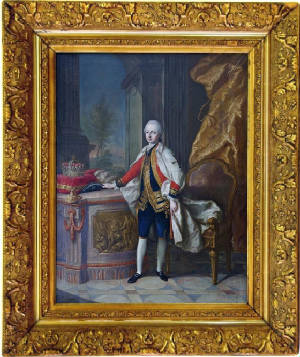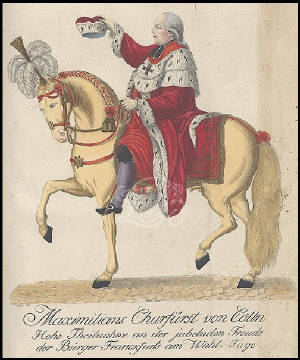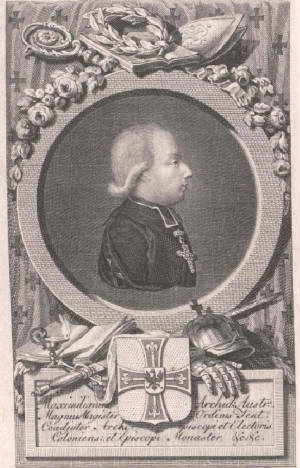Archduke Maximilian Francis of Austria
Archduke Maximilian Francis of Austria (full German name: Maximilian
Franz Xaver Joseph Johann Anton de Paula Wenzel von Österreich, 8 December 1756 in Vienna – 26 July 1801
in Vienna) was Archbishop and Elector Spiritual of Cologne (and as such Chancellor of the Holy Roman Empire for Italy), and
Grand Master of the Teutonic Knights. He was the youngest child of the Habsburg ruler of Austria, Maria Theresa, and her husband,
Francis I, Holy Roman Emperor, for whom he was named. His siblings included Holy Roman Emperors Joseph II and Leopold II,
Maria Carolina, Queen of Naples and Sicily, and Marie Antoinette, Queen of France and Navarre. He was the last fully functioning
Elector of Cologne and was the employer and patron of the young Ludwig van Beethoven.

Biography
Maximilian
Francis was born in the Hofburg Palace, Vienna. In 1780, he succeeded his uncle Prince Charles Alexander of Lorraine as Hochmeister
(Grand Master) of the Deutscher Orden (Teutonic Knights). In 1784, he became Archbishop and
Elector of Cologne, living in the Electoral residence
at Bonn. He remained in that office until his death in exile. In his capacity as chancellor of the Holy Roman
Empire for Italy and as the Pope's deputy he crowned as Emperor in Frankfurt first his brother Leopold II in
1790, and in 1792 his nephew Francis II. At the same time as he became Elector of Cologne, Maximilian Francis was elected to the related Bishopric of Münster and held court in Bonn, as the Archbishop-Electors of Cologne had been forced to do since the late Middle
Ages. A keen patron of music, Maximilian Francis maintained a court musical establishment in which Beethoven's father was
a tenor, thus playing an important role in the son's early career as a member of the same
musical body of which his grandfather, also named Ludwig van Beethoven, had been Kapellmeister.

The court organist, Christian Gottlob Neefe, was Beethoven's early
mentor and teacher. Recognising his young pupil's gift both as a performer and as a composer, Neefe brought Beethoven to
the court, advising Maximilian Francis to appoint him as assistant organist. Maximilian Francis, too, recognised the extraordinary
abilities of the young Beethoven. In 1787, he gave Beethoven leave to visit Vienna to become a pupil of Mozart, but the
visit was cut short by news of the last illness of Beethoven's mother, and evidence is lacking for any contact with Mozart.
In 1792, shortly after Mozart's death, Maximilian again sent Beethoven on full salary to Vienna to study under Joseph Haydn,
Antonio Salieri and others. The Elector maintained an interest in the young Beethoven's progress, and several reports from
Haydn to Maximilian detailing it are extant. The prince anticipated that Beethoven would return to Bonn and continue working
for him, but due to the subsequent political and military situation his subject never returned, choosing to pursue a career
in Vienna.

Maximilian Francis's rule over most of the Electorate ended in 1794, when his domains were overrun by the troops
of Revolutionary France. During the French Revolutionary Wars, Cologne and Bonn were both occupied by the French army in
the second half of 1794. As the French approached, Maximilian Francis left Bonn, as it turned out never to return, and his
territories on the left bank of the Rhine eventually passed to France under the terms of the Treaty of Lunéville
(1801). The Archbishop's court ceased to exist. Although Maximilian Francis still retained his territories on the right bank
of the Rhine, including Münster and the Duchy of Westphalia, the Elector, grotesquely corpulent and plagued by ill
health, took up residence in Vienna after the loss of his capital and remained there until his death at the age of 45, at
Hetzendorf Palace in 1801. The dismantling of the court made Beethoven’s relocation to Vienna permanent, and his stipend
was terminated. Beethoven planned to dedicate his First Symphony to his
former patron, but the latter died before it was completed. The Electorate of Cologne was abolished by a law of the Holy Roman Empire of 1803. In conspiracy
theories, such as the one promoted in The Holy Blood and the Holy Grail, Maximilian Francis was alleged to be the 22nd Grand
Master of the Priory of Sion.
